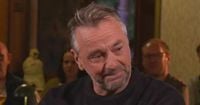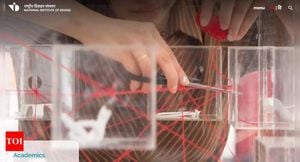Tom Waes made his first television appearance since his serious traffic accident on March 31, 2025, during the show 'Vive le vélo, leve de Ronde'. The actor and television presenter reflected on the harrowing experience of his accident, which occurred in November 2024, and shared his emotional recovery journey.
Waes suffered severe injuries in the crash, including a head wound, broken ribs, and a fractured hip. He expressed the overwhelming feelings of shame and guilt he feels towards his children, girlfriend, and parents. "The shame is enormous. I have an enormous sense of guilt towards my children, my girlfriend, and my parents. But I also feel very guilty towards the man who was in the crash absorber and was slightly injured," Waes said, his voice thick with emotion.
During the show, host Karl Vannieuwkerke did not shy away from addressing the accident directly, asking Waes about his physical and mental state. Waes candidly explained, "I had a reasonably serious head injury, broken ribs, and a broken hip. That is, of course, completely my fault. But that is the physical, and that is the least serious. You can get through that with hard work. But the mental is another story." He described waking up from a coma to find his loved ones in tears, fearing for his life. "Waking up from a coma with your children and your girlfriend crying at your bedside, not knowing if and how I would come out of it, that is something," he recalled.
Waes's accident occurred when he collided with a crash absorber near the Kennedytunnel after a night out at a restaurant and café in Antwerp South. Following the incident, it was revealed that he had 2.44 promille of alcohol in his blood, equivalent to 14 glasses of beer, and he was not wearing a seatbelt at the time of the crash. "We had drunk way too much, I won't hide that under the rug," he admitted. "It was a heavy night out with friends, after which you only realize later how much you actually drank. It is said: fourteen pints. They weren't pints, but it was indeed a lot. It's good that this is being pointed out because it can make people realize how quickly you can get there."
In a moment of reflection, Waes recounted his meeting with the individual who was in the crash absorber he hit. "I called him because I wanted to meet him. I injured someone, that is my fault. But we had an incredibly warm meeting," Waes testified. The man, who had sustained a minor shoulder injury, expressed relief that Waes was okay, leading Waes to recognize the critical role that first responders play in such situations. "I realized that the people in those crash absorbers are the first to arrive at an accident. I really came to understand that they are the heroes of the road, people who are there every day," he said.
Waes also acknowledged the backlash he faced for appearing on the show, noting that some viewers expressed their discontent over his presence. "That hurts. I understand that," he said. However, he also revealed that he has received support from parents who have lost loved ones to drunk drivers. "I have spoken to a number of parents who have reached out to me. That has helped me immensely to process this. I must honestly say: for me, that is therapeutic; it helps me a lot to cope with it. And it helps them. It gives them the opportunity to shift the focus beyond what they have managed to do in recent years. Somehow, I like doing that," Waes explained.
In light of his experiences, Waes has committed to never drinking again if he has to drive. "I will never drink another drop if I have to drive," he vowed. His story serves as a stark reminder of the consequences of drunk driving and the importance of accountability. As he continues to recover physically, attending kinesiologist sessions three times a week, the mental scars of the accident remain a significant challenge.
Waes's appearance on 'Vive le vélo' not only highlights his personal journey but also serves as a wake-up call for viewers regarding the dangers of drinking and driving. Lotte Claes, a professional cyclist and guest on the show, emphasized the importance of this message, stating, "Drinking and driving do not mix. You can't justify that, and Tom realizes that too. Because he is well-known and somewhat of a role model, it can perhaps serve as a wake-up call for the public that when you drive, you don't drink."
As Waes navigates the path to recovery, both physically and emotionally, his story resonates as a cautionary tale for many. He reflects on the lessons learned and the responsibility he now carries, hoping to use his experience to raise awareness about the dangers of alcohol consumption and driving. The journey ahead may be long, but Waes is determined to emerge stronger and more aware of the impact of his actions.






